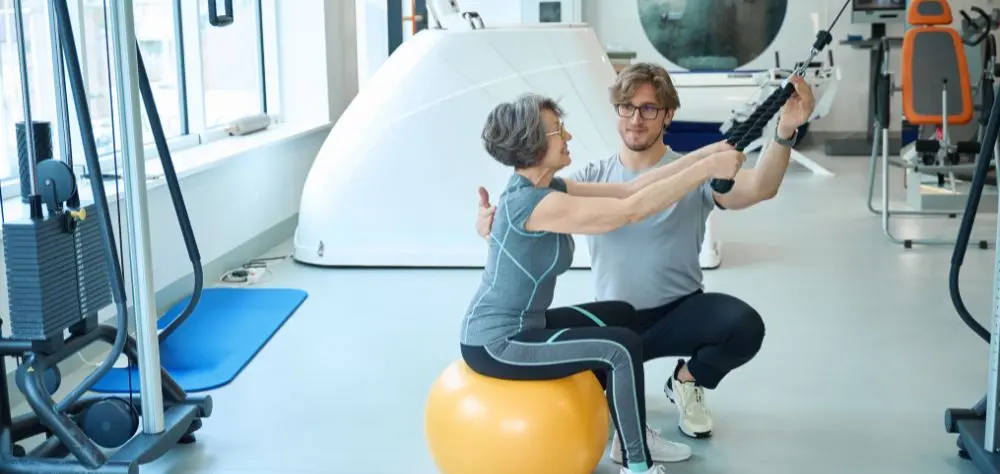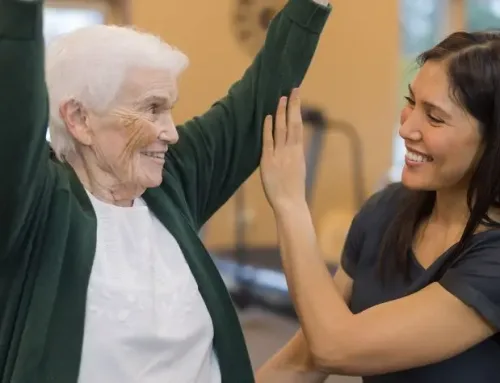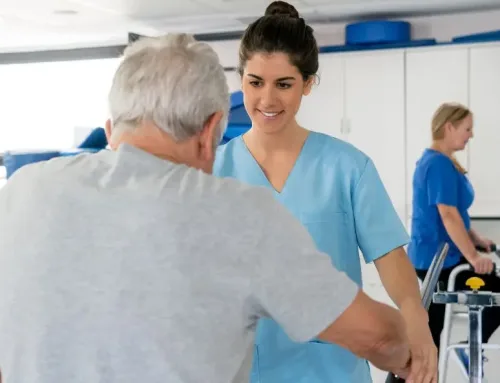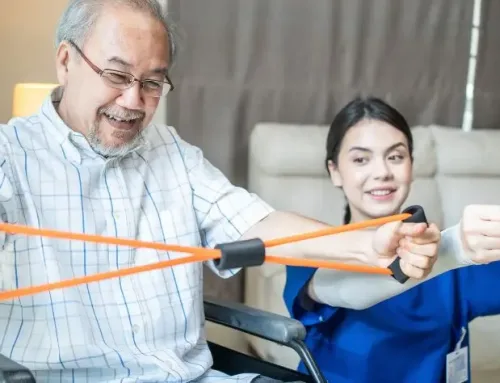Hybrid Occupational Therapy Programs for Flexibility and Hands-On Learning

Becoming an Occupational Therapist takes years of dedication and hard work, but traditional programs often require sacrifices that feel even more out of reach—asking you to pause your life in regards to family, work, and community. How do you focus on both your calling and your commitments?
SCU’s hybrid Doctorate of Occupational Therapy is a path designed for students who refuse to choose between life and learning. Here, you’ll gather with peers in live online classrooms, walk the halls of practice during on-campus immersions, and learn by doing, not by watching. Our faculty—leaders and healers at the forefront of Occupational Therapy—will walk beside you, without unrooting your life.
What Sets SCU Apart
Not all online learning is created equal. At SCU California campus, our hybrid Occupational Therapy program is built on the belief that the best learning happens by doing—not just by listening.
That’s why our online coursework is live and fully interactive, with small class sizes, one-to-one faculty engagement, and hands-on exercises designed to prepare you for the real-world demands of occupational therapy. This is graduate education reimagined: alive, engaged, and anchored in the realities of modern life.
In addition to synchronous online classes, you’ll join us on campus three weeks per term for immersive lab experiences, skill-building, and faculty mentorship. You’ll also complete clinical fieldwork in approved community settings, working directly with patients under professional supervision.
A Lifestyle Medicine Focus, Led by Top-Tier Faculty
At SCU, our occupational therapy program prepares students to promote whole-person health. Grounded in the principles of lifestyle medicine, our curriculum emphasizes the role of movement, nutrition, mental well-being, and stress management in holistic, long-term health outcomes. This approach equips graduates to help patients not only recover, but thrive.
Our faculty are leaders in the field that bring clinical expertise and a passion for student excellence to small classrooms with 1-on-1 support. Students receive the mentorship they need to grow into confident, compassionate practitioners.
SCU stands apart in our technology-integrated approach. From telehealth strategies to using virtual reality (VR) for trauma relief and client engagement, we prepare students to work at the intersection of healthcare and technology. This includes training in innovative tools like virtual reality for trauma relief and client engagement—reflecting California’s leadership in tech-driven healthcare.
Choosing a Hybrid Occupational Therapy Program
Choosing the right OT program is about finding a balance between flexibility and real-world training. Most hybrid occupational therapy programs give students the freedom to attend courses remotely while still gaining the hands-on experience needed for licensure and career success.
So why are more students choosing hybrid OT programs? Let’s explore the key benefits that make this model a game-changer for future occupational therapists.
The Benefits of SCU’s Hybrid OT Program
- Structured Flexibility with a Remote Format: While hybrid OT programs follow a full-time schedule, many offer the ability to attend classes remotely—eliminating the need to relocate. With SCU, you get the benefits of a live classroom digitally with synchronous learning and no pre-recorded lectures.
- Access to Cutting-Edge Online Learning Tools: SCU’s hybrid program integrates virtual reality (VR), interactive anatomy software, and virtual case simulation programs to enhance learning.
- Hands-On Training for Practical Skill Development: On-campus intensives give students the opportunity to practice a wide range of OT skills, including splinting, adaptive equipment use, and therapeutic interventions for both physical and cognitive conditions. Labs also focus on motor skills, sensory integration techniques, functional assessments, mental health strategies, and interventions for pediatric, adult, and older adult populations.
- Localized Clinical Rotations: Unlike fully on-campus programs that may require relocation, hybrid models often allow students to complete their fieldwork in their own communities. Clinical placements provide valuable hands-on experience in hospitals, schools, rehab centers, and outpatient clinics.
- Faster Completion & Career Advancement: The Doctorate of Occupational Therapy program at SCUHS is fully accredited by ACOTE, our program ensures you’re eligible to sit for the NBCOT exam and become a licensed occupational therapist within 2 years and three months of your start date. You’ll graduate equipped with the latest methods, technologies, and clinical best practices, ready to step confidently into careers in telehealth, pediatrics, corporate ergonomics, and more.
Plus, you’ll graduate ahead of the curve.
While earning your doctorate, you’ll also complete coursework that counts toward two additional professional credentials:
- Physical Agent Modalities (PAM) Certification – Earn hours toward California’s PAM certification requirements.
- American College of Lifestyle Medicine (ACLM) Exam Eligibility – Complete your 10-hour conference requirement through our Wellness & Lifestyle Health course.
It’s a head start toward specialization—helping you stand out in a competitive job market and expand your impact as a healthcare professional.
What to Expect from the Hands-On Side of a Hybrid OT Program
Throughout the program, students attend several in-person lab sessions per year, where they gain essential hands-on experience in patient-care skills such as:
- Neurological rehabilitation techniques, learning how to support patients recovering from strokes, brain injuries, or neurodegenerative conditions.
- Pediatric and adult OT intervention and assessments, including sensory integration, fine motor skills, and cognitive intervention and evaluations.
- Assistive device training, where students work with orthotics, splint fabrication, and adaptive technology to improve patient mobility and independence.
- Explore how VR technology can improve therapeutic outcomes by exploring immersive, controlled environments that help patients process trauma, develop motor skills, and build confidence in real-world scenarios.
These sessions provide the opportunity to apply theoretical knowledge in a controlled, hands-on setting, ensuring students are confident in their clinical skills before entering fieldwork placements.
Fieldwork & Clinical Rotations
No OT program—hybrid or not—would be complete without real-world patient experience. Hybrid programs include:
- Level I and Level II fieldwork, ensuring students work directly with patients under licensed OT supervision.
- Clinical placements coordinated near students’ locations, reducing the need for long-distance travel or relocation.
This structure allows students to develop hands-on skills in hospitals, schools, rehab centers, and outpatient clinics, giving them a well-rounded clinical foundation before entering professional practice.
Capstone Project
For doctoral OT students, the capstone project is a major milestone. This in-depth project allows students to:
- Conduct research on a specialized OT topic.
- Develop new therapeutic interventions that could improve patient outcomes.
- Focus on a niche area, such as adaptive sports, mental health, or pediatric sensory therapy.
Capstone projects enhance expertise and professional credibility, helping students build a strong foundation for leadership roles, advanced clinical practice, or research-based careers.
From lab intensives and clinical rotations to innovative capstone projects, students graduate with the practical skills, confidence, and real-world experience needed for a successful OT career.
SCU’s OTD Program: More Flexibility, More Innovation, More Opportunity
At SCU, we know that earning your Doctor of Occupational Therapy (OTD) shouldn’t mean putting your life on hold. Our hybrid format blends online coursework with hands-on training, allowing students to study from anywhere while still gaining essential clinical experience.
Remote-Friendly Format
We designed our online-blended OTD program for students who need flexibility without sacrificing hands-on experience.
- 80% of coursework is completed online, through live, scheduled classes that you can attend remotely.
- Four in-person training sessions per year (three weeks each) take place at our Whittier, California campus.
- Clinical rotations are completed near your home at one of our partner sites, making fieldwork accessible.
This structure allows our students to balance their education with other commitments while still receiving top-tier clinical training.
Student-Led Capstone Project
At SCU, our OTD students don’t just complete coursework—they contribute meaningful research and innovation to the field of occupational therapy. Our doctoral capstone project is a defining part of the program, allowing students to dive deep into an area of passion, whether that’s pediatric therapy, adaptive technology, or neurological rehabilitation. This project isn’t just about academic research; it’s a chance to develop new therapeutic programs, create innovative solutions, or advance OT practices in real-world settings. With the guidance of a dedicated Capstone Mentor, students receive personalized support through online seminars and hands-on project development, ensuring their work makes a lasting impact on the profession.
Head-Start Toward Additional Credentials
With SCU’s OTD program, you’re not just earning a doctorate—you’re gaining extra qualifications that enhance your career.
- Physical Agent Modality (PAM) courses count toward California’s PAM certification, giving you a competitive edge.
- Our Wellness & Lifestyle Health coursework qualifies as a substitute for the 10-hour conference requirement for the American College of Lifestyle Medicine (ACLM) Certification Exam.
These additional credentials expand your expertise and open new career opportunities before you even graduate.
Technology-Enhanced Learning
At SCU, we go beyond textbooks and lectures. Our students train with the latest technology, including:
- Clinical Driving Simulator: Teaches mobility rehabilitation and patient safety strategies.
- 3D Printing: Hands-on experience creating custom assistive devices.
- Virtual Reality (VR) Therapy: Immersive patient simulations for real-world clinical training.
- Complete Anatomy & DITKI Interactive Learning Tools: Advanced anatomy visualization and interactive study methods to reinforce complex concepts.
Broader Interprofessional Education
We believe that exceptional occupational therapists understand how to work across multiple healthcare disciplines. That’s why our interprofessional education model goes beyond the standard approach, integrating both conventional and complementary healthcare practices into our curriculum.
Our students collaborate with professionals in fields like physical therapy, chiropractic care, and integrative medicine, learning how to approach patient care from a truly comprehensive and holistic perspective.
Ready To Take the Next Step in Your OT Career?
Hybrid occupational therapy programs like ours at SCU are designed for students who need flexibility without sacrificing hands-on experience. With a blend of online coursework, in-person clinical training, and high-tech learning tools, we prepare students to thrive in a fast-evolving OT field.
Whether you’re an OTA looking to advance, a career changer, or just starting your journey, this is where you take the next step. Take a look at our admission requirements and apply today!
FAQs
What makes hybrid occupational therapy programs different from fully online programs?
Hybrid OT programs blend online coursework with in-person hands-on training. While lectures and assignments can be attended remotely, students must attend scheduled lab intensives and clinical rotations to develop real-world patient care skills—something fully online programs simply can’t offer.
Can I complete a hybrid OT program while working full-time?
OT programs are rigorous, and most students find it challenging to balance full-time work. Some hybrid programs offer more flexible scheduling, but you’ll still need time for remote attendance in live courses, clinical rotations, labs, and coursework.
Do hybrid OT programs require travel?
Yes, but not as much as traditional in-person programs. Most require students to attend in-person lab sessions a few times per year at designated locations while allowing them to complete fieldwork placements closer to home.
Are hybrid OT degrees respected by employers?
Absolutely. SCU’s OTD is accredited by ACOTE, employers recognize hybrid degrees the same way they do traditional ones. What matters most is that graduates meet licensure requirements and gain the hands-on experience necessary for patient care.
What makes SCU’s hybrid OTD program unique?
We combine 80% online coursework with in-person clinical training, allowing students to study from anywhere without relocating. Our program also incorporates cutting-edge technology like VR therapy and 3D printing, plus a capstone project that builds specialized expertise.
Does SCU help students find clinical fieldwork placements?
Yes! We work closely with students to secure fieldwork placements near their home whenever possible. We have partnerships with healthcare facilities across the U.S., ensuring students get diverse, real-world clinical experience.
Related Posts




